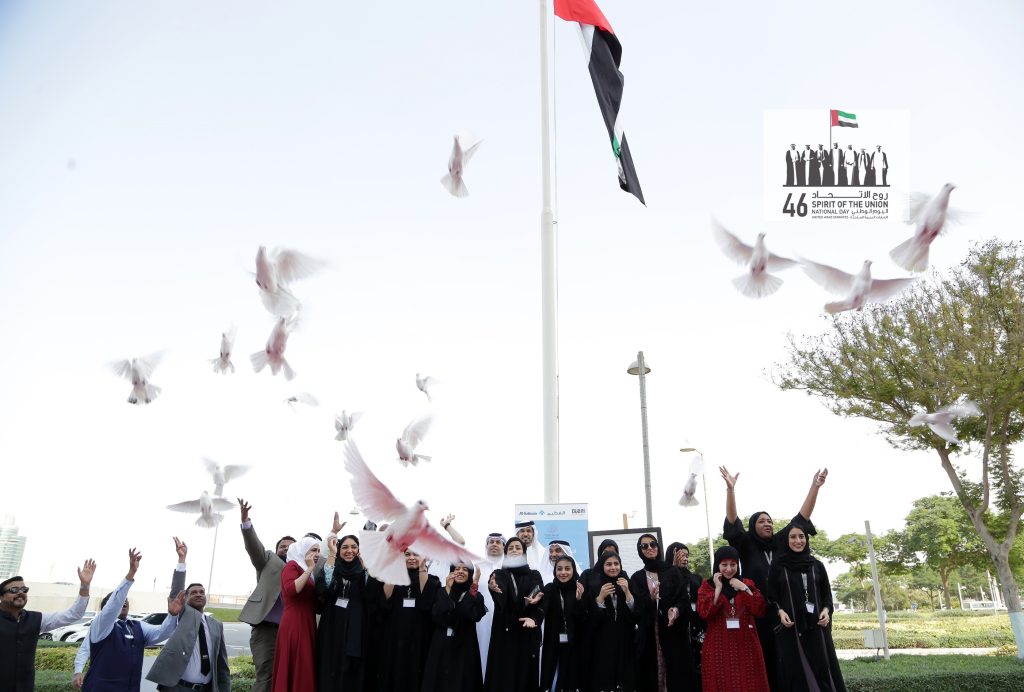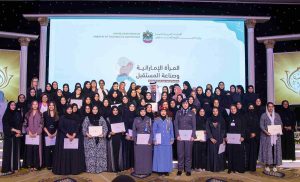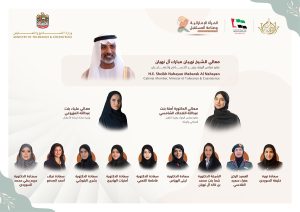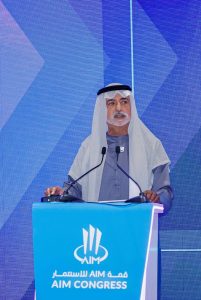ABU DHABI, 29th November, 2017 (WAM) — On the occasion of the UAE’s 46th National Day celebrations, the Emirates News Agency, WAM, has compiled a series of reports regarding the achievements of the state over the past year. In part eleven, we look at the UAE’s promotion of the values of tolerance and happiness.Tolerance In 2017, the promotion of the values of tolerance and acceptance remained high on the UAE Government’s agenda, as it continuously reaffirmed its strong determination to spread those values amongst the people of all cultures and religions, both nationally and internationally.One of the most notable gestures towards this cause was the decision by His Highness Sheikh Mohamed bin Zayed Al Nahyan, Crown Prince of Abu Dhabi and Deputy Supreme Commander of the UAE Armed Forces, in June to rename the mosque in Abu Dhabi carrying his name to the ‘Mary, Mother of Jesus Mosque’. The decision gained widespread praise from citizens and residents, as well as from local and international officials.Among those commenting was British politician Lord Alton of Liverpool, the founder of the UK All-Party Parliamentary Group for Freedom of Religion and Belief. The naming of the mosque is powerful evidence of the commitment of the United Arab Emirates to the principles of religious tolerance. The Virgin Mary is of enormous importance in the beliefs of both Christians and Muslims, while Jesus is highly respected as a prophet in Islam, he said.The country’s continual efforts to promote religious tolerance and understanding were also demonstrated when in July, a conference in Abu Dhabi brought together the congregations of Mosques, Churches, and other houses of worship to enhance relations of mutual respect.Hilf al-Fudul, or the Alliance of Virtue, gathered representatives of the three Abrahamic religions. Clergymen from the three religions met to establish a human ethical code, as a first step towards issuing an internationally binding document that combats anti-Muslim sentiment, antisemitism and all forms of hatred, discrimination and bigotry.Efforts to reinforce the work of the National Programme for Tolerance, which was launched in 2016, also continued. In June, an International Institute for Tolerance was established by His Highness Sheikh Mohammed bin Rashid Al Maktoum, Vice President, Prime Minister of UAE and Ruler of Dubai.The Law on the Establishment of the International Institute for Tolerance included the launching the Mohammed bin Rashid Al Maktoum Tolerance Award, which is administered in accordance with the provision of the law, and establishing its statutes in correlation with the Institute.Speaking on the occasion, H.H. Sheikh Mohammed said, The establishment of the Institute comes at a time when there is a dire need to build bridges of tolerance and solidarity between people. The institute’s doors are open to scholars and tolerance advocates who wish to work towards establishing a culture of tolerance and openness in our societies, and against extremism, fanaticism and intellectual repression. The International Institute for Tolerance aims to instill a spirit of tolerance in society, building a cohesive society and promoting the UAE as a role model for tolerance, anti-extremism, and anti all forms of discrimination among people, including but not limited to, discrimination based on religion, gender, race, colour or language. The law will promote tolerance, encourage open dialogue and highlight the honest and peaceful essence of Islam.Other national initiatives which were launched as part of the National Programme for Tolerance include the Community of Volunteers for Tolerance, the Voice of Tolerance, the Tolerance Initiative, the Teacher’s Covenant for Tolerance, and the Imams’ Covenant for Tolerance.Earlier this year, Sheikha Lubna Al Qasimi, former Minister of State for Tolerance, said, Strengthening the government’s role as a model for tolerance, strengthening of the role of a tightly-knit family unit to build tolerant communities, protecting young people from bigotry and extremism, the enrichment of the science and culture, and contributing to international efforts by highlighting our role as a tolerant country, are the five main pillars of the programme. In July, the UAE, represented by the Constituent Council of the Global Council for Tolerance and Peace, signed a Memorandum of Understanding with the United Nations Population Fund to cooperate in efforts to promote the values of tolerance, build cultural understanding, fight extremism, and promote preventive diplomacy, as part of efforts to contribute in safeguarding international peace.In November, during the opening of a two-day conference entitled, Tolerance in the UAE , organised by the New York University Abu Dhabi, Sheikh Nahyan bin Mubarak Al Nahyan, the newly-appointed Minister for Tolerance, said, This conference provides an excellent opportunity for us to reflect upon the journey of the UAE, one of the most ethnically and religiously diverse countries in the world, but, at the same time, one of the most peaceful, harmonious and prosperous places on earth. Although the UAE is a young country, it nevertheless has an impressive history of tolerance, he said, pointing out that the promotion of the values of tolerance is a joint responsibility of all populations in the country, calling for all people to unite for this purpose.Sheikh Nahyan said that the Ministry of Tolerance is currently drafting a comprehensive plan to promote tolerance and co-existence while highlighting that its mission stipulates the development of mutual respect, peaceful relations and positive understanding among all the country’s residents, regardless of their culture and beliefs.In an interview with WAM, he said that the ministry’s work is based on four key areas: community awareness through programmes that target all segments of the community; building community relations that support tolerance and peaceful co-existence; performing activities and events throughout the year that promote the values of tolerance, and performing research and studies and creating indexes to monitor the implementation and measure the achievement of their desired outcomes.Sheikh Nahyan highlighted the importance and vital role of education in developing the values of tolerance and co-existence among members of the community while adding that all students must understand and respect different cultures, civilisations and religions, and schools should be effective in preventing students from being attracted to violence or terrorism.He stressed that the Ministry of Tolerance works for everyone, whether UAE citizens or foreigners, and the role of foreigners in the country is to convey the message of tolerance from the UAE to the entire world. We in the UAE are proud of the fact that tolerance and peaceful co-existence is a key part of the journey of our nation, and our role in promoting tolerance around the world is reflected by our consecutive achievements in bringing hope and optimism to the relations between civilisations and cultures, he said.Sheikh Nahyan further said that the launch of Louvre Abu Dhabi is an excellent example of this while noting that the UAE’s role in promoting tolerance also extends to local laws and legislation that prevent hate and extremist crimes and counter all forms of discrimination.This role also includes the country’s consecutive and ongoing efforts to develop its education system and confirm the relevant responsibilities of the media while highlighting their importance in introducing the world to the tolerant nature of Islam and its contributions to the history of humanity. In the UAE, both nationals and other residents enjoy respect and dignity, and we add this to our important global role, which includes participating in global conferences, both inside and outside the UAE, and permanently communicating with relevant institutions around the world, he added, while pointing out that tolerance in the UAE is an important part of the country’s foreign affairs policies, as it has a positive effect on building successful international relations and is a key aspect of soft power, confirming the UAE’s leading international stature.Happiness The happiness of society remains a primary goal of the UAE leadership, and in 2017 the government continued its efforts to achieve people’s happiness and satisfaction through the provision of high-quality, efficient and smart government services, and by the launching of a number of initiatives to spread awareness on how incorporating positive values such as generous acts of giving, practicing tolerance, and leading a healthy and creative lifestyle, can all lead to achieving happiness.This year, the National Programme for Happiness and Positivity, under the leadership of Ohoud bint Khalfan Al Roumi, Minister of State for Happiness and Wellbeing, developed the world’s first ‘Happiness Policy Manual’.According to the minister, the manual seeks, first and foremost, to introduce the science of happiness to the policy-making process, proposing innovative ways to incorporate it into current and future public policies and then evaluating their effect on the happiness and wellbeing of society. The manual balances personal happiness with societal aspects. It complements the National Programme for Happiness and Positivity’s efforts to empower Government entities by providing practical instruments for them to harmonise their policies and steer them towards achieving nation-wide happiness, she said, urging all government departments to benefit from the tools and concepts provided in the manual to incorporate happiness into their policies and programmes and, finally, evaluate their effect on target segments.In March, The United Arab Emirates University, UAEU, opened the Emirates Centre for Research on Happiness in collaboration with the National Happiness and Positivity Programme, a first of its kind in the UAE and Middle East.In a statement on the occasion, Ohood Al Roumi said, We celebrate happiness as a value and a goal for people, and a basic need for humans around the globe, as important as any of the other needs in life. The UAE was established on happiness and has chosen it as an approach since the era of the founding fathers. In light of the clear understanding in our country of the importance of happiness as a science, which has foundations, methods, applications and scientific benchmarks, we have established a partnership with the UAEU, a prestigious national university, to launch the centre for happiness research, to practically embody our ongoing efforts to support and enhance happiness and positivity in society, through expanding specialised scientific studies, and observing the happiness indicators, besides monitoring trends and visions of society, so as to enhance our sponsorship of the scientific content of happiness in the UAE, and to contribute to scientific findings worldwide, she added.2017 also saw the ranking of the UAE as the happiest country in the Arab world for the third consecutive year in the UN World Happiness Report 2017.Commenting on the report, His Highness Sheikh Mohammed bin Rashid Al Maktoum tweeted that the UAE ranked first in the Arab region and was 21st globally, advancing eight points in the rankings. The UAE came first in the Arab world for the third consecutive year and the Emirati people are ranked 21st as the happiest people in the world. We are also ranked first globally regarding the satisfaction of residents from other countries, he said.Reaffirming the UAE leadership’s determination to achieve happiness in UAE society, Sheikh Mohammed bin Rashid, during his participation in the Journey of Happiness event on the Dubai Water Canal in March on the occasion of International Day of Happiness, said, Happiness is a human value and the UAE leadership is working to generalise this value and entrench it as lifestyle for all members of the Emirati society. 300 international specialists in the field of happiness gathered in February at the Global Happiness Dialogue, the first international event of its kind, held before the World Government Summit.The event featured workshops and sessions on various topics such as stimulating the policies, way of measuring, and the science of happiness and ways of achieving happiness in cities.The outcome of these workshops and sessions were compiled in a manual and shared to help governments raise the level of happiness across nations.In March, the UAE announced the creation of the first World Happiness Council with a remit to address increasing global challenges and transformations and create new policies and approaches that will create a more hopeful future.Speaking on the occasion, Sheikh Mohammed bin Rashid said that government work is at the forefront of the required changes to achieve people’s happiness, The UAE, under the leadership of my brother, President His Highness Sheikh Khalifa bin Zayed Al Nahyan, believes that the role of governments is to achieve happiness for their people, by enabling them to choose the tools and means and by providing an environment that accommodates their hopes, ambitions and dreams. He added, Happiness is a good contagion, and we want the peoples of the world to be affected by it, to enjoy its goodness. This requires a tangible change in the culture of government work. We want an actual translation of the goals of international organisations that all share a general goal, represented in strengthening positivity, and maintaining a more sustainable world, and achieving goodness for humankind, he explained.The UAE Government also continued to encourage the act of giving as being a vital component to achieve human happiness and satisfaction, and numerous bodies from the government and private sectors launched humanitarian programmes in support of this throughout the year. Many initiatives were also launched as part of 2017 being named as the ‘#Year of Giving.’ One example was the launch of the Giving is Happiness programme in March by the Zayed Giving Initiative. The programme aimed to encourage people to provide an hour of volunteering in different areas such as health, education, culture, sports and environment.In June, representatives from various government agencies launched the ‘Happiness without Borders’ initiative which mobilised efforts to promote a lifestyle based on positivity and stimulate its adoption as a cultural trait in the UAE.Through providing guidance and support to employees, institutions worked together to establish healthy and positive work environments that ensure the happiness of their employees and the satisfaction of their customers.WAM/Rasha Abubaker/Chris Moran”}]




